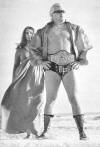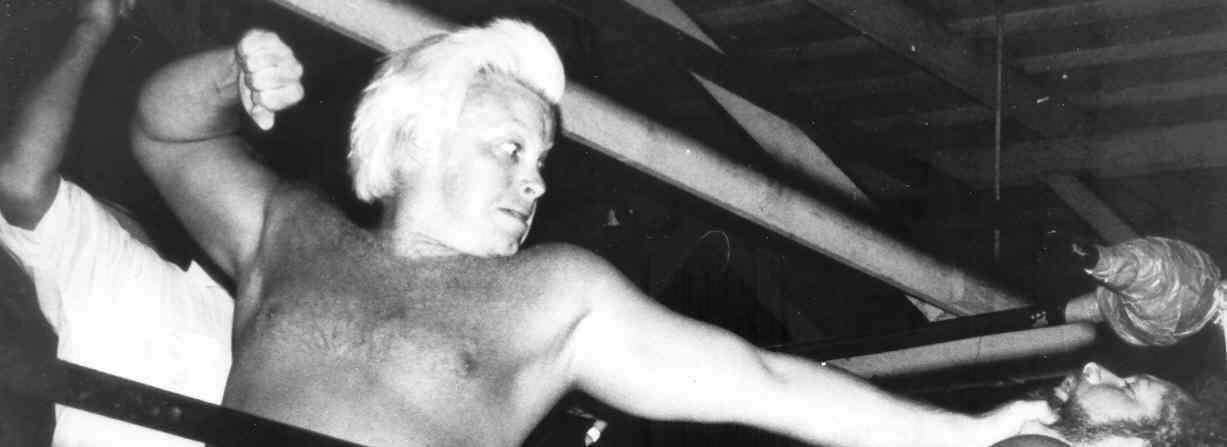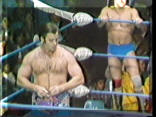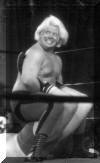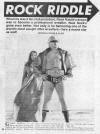|

I must have
done at least a thousand live TV interviews during my
professional wrestling career. This time, however, at
the world’s largest yearly gathering of “wrestling
legends,” the tables had been turned and I was asking
the questions. My company, APS Entertainment (a
Hollywood-based production
 company
and “marketing machine” for actors and others in the
entertainment industry) was shooting footage on location
in Las Vegas. As a producer for the upcoming feature
film “When Wrestling Was Real,” I had the privilege of
conducting on-camera interviews with several of my
famous wrestler friends. And, in anticipation of
readers’ questions … No, the film will not be a
documentary or a docudrama. It will be a “period
piece;” a feature film set in the world of late
1970s/early 1980s professional wrestling. The
screenplay is based on real people who made an impact in
the wrestling world … the way it used to be. The
interviews were shot for possible inclusion for the
opening and closing scenes of the movie. company
and “marketing machine” for actors and others in the
entertainment industry) was shooting footage on location
in Las Vegas. As a producer for the upcoming feature
film “When Wrestling Was Real,” I had the privilege of
conducting on-camera interviews with several of my
famous wrestler friends. And, in anticipation of
readers’ questions … No, the film will not be a
documentary or a docudrama. It will be a “period
piece;” a feature film set in the world of late
1970s/early 1980s professional wrestling. The
screenplay is based on real people who made an impact in
the wrestling world … the way it used to be. The
interviews were shot for possible inclusion for the
opening and closing scenes of the movie.
I was interviewing my friend, Playboy Buddy Rose. Last
week, I shared Part One of the interview with you.
Today, I’ll pick up where we left off. We were
discussing the “good old days” when we used to wrestle
every single day, day in and day out, for months and
months at a time. We talked about the “double shot”
days when we would wrestle two different opponents in
two different towns in the same day. We recalled how
strange it was to have a day off. We talked about the
various wrestling “territories.” We compared and
contrasted those with “short trips” where you could be
home just about every night and those with the very long
trips where it was unusual to get back home at all
between wrestling gigs. We talked about the strain on
the wrestlers who had wives and families, and we talked
about our love of the business.
“I spent a lot of time in the Northwest because the
trips were short and I could be home every night,” Buddy
Rose explained. “Traveling the world, of course,” Buddy
explained, “and seeing the world; that’s one of the
great things about this business. You and I, Rock, have
lived the life that probably most people who are eighty
years old could only dream of. The fact that we’ve been
to all of the countries and lived in their cultures is
more than most people could even imagine.” Buddy had
pointed out how lucky we were to have lived such an
amazing life. I smiled because I agreed. “I have to
say,” Buddy continued, “that there’s no other country
anywhere like the United States of America. After
living in so many countries with all the different
people and so many different cultures, the United States
of America is the best place to be.”
 I
wanted Buddy to share more insight into the wrestling
business. “It was a wonderful business,” I said, “but
it could also be a pretty tough business.” “Yes, the
business was tough,” he admitted. “It could be very
tough. You worked [wrestled] when you were hurt.
Today, it’s different. Today, if you get hurt – even if
you hurt your pinky and the doctor says you’re hurt, you
still get your contract money. In our day, we were
living off the houses [the amount of money from ticket
sales at the various arenas], and our pay was based on
how good the houses were.” I agreed. “And, if you did
get hurt,” Buddy continued, “somebody else would take
your spot – and you weren’t getting paid! And, most of
the time you had to pay your own doctor bills, depending
on the promoter.” I could only think of one promoter
who ever paid for one of my doctor bills. Promoters
paying a wrestler’s doctor or hospital bill was almost
unheard of. And, like most wrestlers, I spent a fair
amount of money on doctors. I smiled and said, “Do you
mean to tell us that you actually knew a wrestling
promoter who paid?” “Yes,” Buddy quickly answered.
“Promoter Don Owens paid.” I was amazed. “Really?” I
asked, astonished. “Don Owens would pay,” Buddy
reiterated, “if you got hurt in the ring. If you got
hurt on your own, no. I mean, if you got hurt stumbling
off your step at home or something, no.” Buddy had a
mischievous look for a moment as though it would be
really funny to spend the next fifteen minutes listing
all of the ways someone could conceivably hurt
themselves outside of the ring. I smiled and shook my
head slightly. He raised an eyebrow which, to me,
indicated, “Okay, Rock, maybe you’re right,” and he
continued on a more serious note. “But, if you got hurt
in the ring,” he explained, “yes, he would pick up the
doctor bills. But, if you were off because of that
injury for two weeks, you weren’t getting any checks, so
you wanted to -- you had to -- keep working even though
you were hurt. That happened many, many times, and you
know what that was like.” I
wanted Buddy to share more insight into the wrestling
business. “It was a wonderful business,” I said, “but
it could also be a pretty tough business.” “Yes, the
business was tough,” he admitted. “It could be very
tough. You worked [wrestled] when you were hurt.
Today, it’s different. Today, if you get hurt – even if
you hurt your pinky and the doctor says you’re hurt, you
still get your contract money. In our day, we were
living off the houses [the amount of money from ticket
sales at the various arenas], and our pay was based on
how good the houses were.” I agreed. “And, if you did
get hurt,” Buddy continued, “somebody else would take
your spot – and you weren’t getting paid! And, most of
the time you had to pay your own doctor bills, depending
on the promoter.” I could only think of one promoter
who ever paid for one of my doctor bills. Promoters
paying a wrestler’s doctor or hospital bill was almost
unheard of. And, like most wrestlers, I spent a fair
amount of money on doctors. I smiled and said, “Do you
mean to tell us that you actually knew a wrestling
promoter who paid?” “Yes,” Buddy quickly answered.
“Promoter Don Owens paid.” I was amazed. “Really?” I
asked, astonished. “Don Owens would pay,” Buddy
reiterated, “if you got hurt in the ring. If you got
hurt on your own, no. I mean, if you got hurt stumbling
off your step at home or something, no.” Buddy had a
mischievous look for a moment as though it would be
really funny to spend the next fifteen minutes listing
all of the ways someone could conceivably hurt
themselves outside of the ring. I smiled and shook my
head slightly. He raised an eyebrow which, to me,
indicated, “Okay, Rock, maybe you’re right,” and he
continued on a more serious note. “But, if you got hurt
in the ring,” he explained, “yes, he would pick up the
doctor bills. But, if you were off because of that
injury for two weeks, you weren’t getting any checks, so
you wanted to -- you had to -- keep working even though
you were hurt. That happened many, many times, and you
know what that was like.”
Yes, I knew very well what it was like to wrestle while
injured. Flashing through my mind at that moment were
the times I wrestled, against doctor’s orders, five
nights straight with contusions and cracked ribs. I
thought of the times I had wrestled with a broken nose,
a broken thumb, a ruptured eardrum and the countless
times I had stepped into the ring with sprained ankles,
sprained wrists, and multiple additional injuries. I
thought of friends who had wrestled with broken bones.
I recalled the one and only time that a promoter paid
for my hospital visit. I had fought my way, in street
clothes, through a beyond-hostile crowd, to help get a
trapped top-money-making main event wrestler safely back
to the dressing room. The fact that the fans were
totally out of control and that I was risking my life to
save the wrestler never was a serious consideration. I
was amazed that one of the promoters met me at the
hospital and paid the bill for me to have my head
stitched back together. There were so many things I
could have said in response to Buddy’s statements.
“But this isn’t the Rock Riddle Show,” I thought to
myself. “This is Buddy’s interview, and he has
limited time.”
 Buddy
had a serious expression on his face. He was talking
directly to me, but thanks to many years of doing
interviews, he was “cheating” the camera. For Buddy
had a serious expression on his face. He was talking
directly to me, but thanks to many years of doing
interviews, he was “cheating” the camera. For those non-Hollywood types, that means he was looking
somewhere between my face and the camera. That way, the
viewers got to see all of his face, not just a profile.
“I don’t know how we made it through for all these years
without a scratch [serious injury],” he said, now
directing his attention fully to the camera. Of
course,” he continued, “even though I got banged up, and
took, the same as Rock Riddle, thousands and thousands
of ‘bumps’ in the ring, and bled ... I just don’t know
how close we came, just trying to tuck in time, just
trying to land in time … how close we came to becoming
quadriplegic. We must have had angels watching over
us.” I nodded, realizing how right he was and how lucky
we were. “We’ve lost a lot of wrestlers,” Buddy
continued, with sadness in his voice. “Some are because
of scientific reasons, the modern day medicines that
have come out. We all know that those are some of the
reasons.” Buddy got even more serious. “But, I’ve also
learned …” There was a slight pause before he
continued. “I went to rehab myself … for …” Yes, dear
readers, we’ll continue this most serious side of the
Playboy Buddy Rose interview next week. Until then,
thank you! And, keep those e-mails coming.
those non-Hollywood types, that means he was looking
somewhere between my face and the camera. That way, the
viewers got to see all of his face, not just a profile.
“I don’t know how we made it through for all these years
without a scratch [serious injury],” he said, now
directing his attention fully to the camera. Of
course,” he continued, “even though I got banged up, and
took, the same as Rock Riddle, thousands and thousands
of ‘bumps’ in the ring, and bled ... I just don’t know
how close we came, just trying to tuck in time, just
trying to land in time … how close we came to becoming
quadriplegic. We must have had angels watching over
us.” I nodded, realizing how right he was and how lucky
we were. “We’ve lost a lot of wrestlers,” Buddy
continued, with sadness in his voice. “Some are because
of scientific reasons, the modern day medicines that
have come out. We all know that those are some of the
reasons.” Buddy got even more serious. “But, I’ve also
learned …” There was a slight pause before he
continued. “I went to rehab myself … for …” Yes, dear
readers, we’ll continue this most serious side of the
Playboy Buddy Rose interview next week. Until then,
thank you! And, keep those e-mails coming. |
